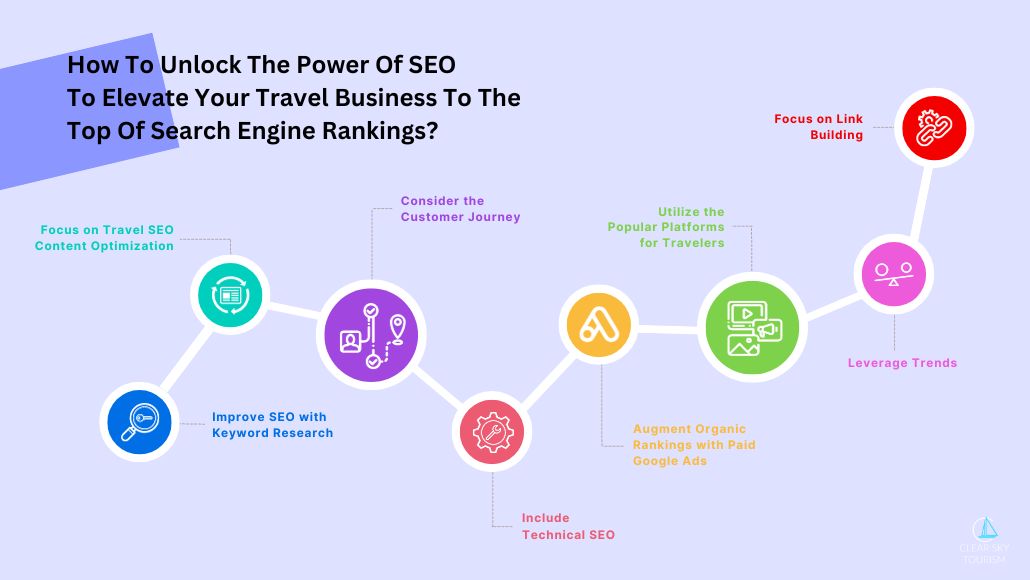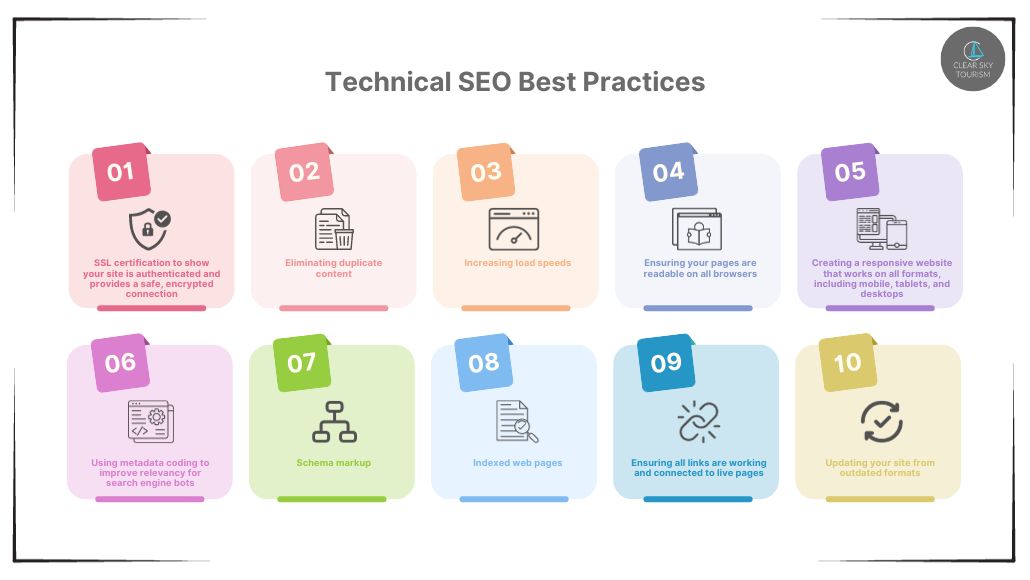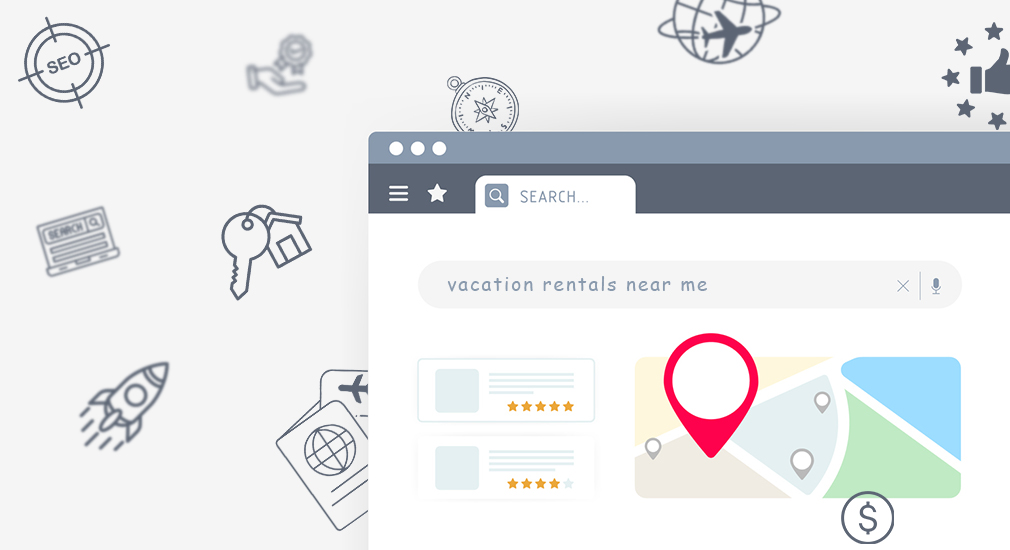Travel businesses are up against heavy competition thanks to evolving travel-specific search engines and sites like TripAdvisor. Guests have more research tools available than ever, allowing them to avoid travel agents, map out their travel plans, and make all their travel arrangements. However, the newfound self-reliance of travelers also presents opportunities for you to increase your direct bookings and sales. Here we look at how you can unlock the power of SEO to elevate your travel business to the top of search engine rankings.

Improve SEO with Keyword Research
Keyword research is crucial to improve your rankings. The right keywords help tell your story and what you offer your customers. It also ensures you attract the right customers to reduce bounce rates and maintain better rankings.
Through research, you can find opportunities for less competitive keywords and improve relevance based on the services you offer, the intent of searches, and what you want to rank for. You can create more specific keywords to increase your odds of ranking. For example, if you’re in Hawaii, you might be tempted to include a long list of Hawaii-related keywords every travel business uses. However, it’s a waste of time as you’ll never rank for such broad terms. Instead, you should get very specific using geo keywords, your specific type of service, and longer tail keywords that address intent.
For example, instead of using “car rentals Hawaii,” you can avoid competing with every car rental company in Hawaii by using “SUV rentals” to specify your vehicle type and “Waikiki” to narrow down your location. To address intent, you can use a question, such as “Where are the best SUV vehicle rental companies in Waikiki?” Research helps you find appropriate keywords that aren’t as competitive to improve your SEO.
Focus on Travel SEO Content Optimization
Travel-related businesses don’t just compete against companies for top rankings, but all the influencers and personal bloggers/vloggers vying for attention. Your challenge is that most travelers conducting searches tend to use general terms that allow these other web pages to outrank you time and again. Therefore, to reach the top of the search results, you need to understand how to improve your keyword and content strategy to reach your audience.
Creating relevance between your content and travel keywords is the next step to improving your SEO practices. You can enhance your travel SEO by considering the following in your content optimization:
- Topic relevance: Ensure your target keywords are relevant to your content. Otherwise, search engines will notice the disconnect and overlook you. Also, if search engines do rank you, visitors won’t find what they want, impacting their time on page. A high bounce rate for your web pages tells search engines your content is low quality, which lowers your rankings.
- Image relevance: Using images as part of your content can help increase rankings, but as with topic relevance, your images need to enhance what you write about. You can also use keywords in your image names and meta descriptions to help improve SEO.
- Use links: Links help improve reader experience and therefore impress search engines. Link to relevant information within your site and external links to things like travel stats or in-depth location information to create more authority and improve your ranking. Better yet, find external link sources to provide inbound links leading to pages on your site. For example, having a significant hotel in your area link to your attraction or vice versa, having a major local attraction linking to your hotel page helps build authority.
- Use headings and lists: Instead of sticking to a format of straight copy, find opportunities to use headings and create numbered or bulleted lists. This makes your content scannable and easier to read, which search engines love.
- Increase word count: Higher word counts indicate that your coverage of a topic is more thorough. This is good. However, increasing the word count by packing your content with fluff or repetition will work against you. This isn’t good.
- Content calendars: A content calendar also helps drive your content and SEO. You can align certain types of content to relevant travel periods. For example, if your inn sits at the foot of a ski hill, you can write about skiing in the winter to entice people to visit the area and stay at your inn. If you are a car rental company in New England, write about the best routes to view fall colors to attract visitors who might want to rent a car to explore them.
Consider the Customer Journey
The traveler’s customer journey allows you to find less competitive keywords that help increase your position in the rankings. There are four stages of travel searches:
- Dreaming: This is where travelers are intrigued by a destination and do an aspirational search to learn more.
- Planning: Now that the traveler knows about the destination, they explore the idea of travel in earnest.
- Booking: The time has come to commit to travel and book their transportation or accommodation.
- Experiencing: The traveler has arrived and is looking for things to do.
What SEO tactics can you use to take advantage of these stages? Considering possible scenarios for why people might search for your services helps you determine the best keywords and content to help improve your ranking. You also reduce competition by predicting user intent.
Include Technical SEO

Technical SEO is more complicated for novice travel businesses as it includes the coding structure of web pages. Some of the technical SEO best practices you need to adopt include:
- SSL certification to show your site is authenticated and provides a safe, encrypted connection
- Eliminating duplicate content
- Increasing load speeds
- Ensuring your pages are readable on all browsers
- Creating a responsive website that works on all formats, including mobile, tablets, and desktops
- Using metadata coding to improve relevancy for search engine bots
- Schema markup
- Indexed web pages
- Ensuring all links are working and connected to live pages
- Updating your site from outdated formats
Working with an experienced web design company will ensure that all the technical aspects of SEO are addressed and functioning. They will conduct an SEO audit to find bad links, duplicated content, poor structure, and inadequate keywords for ranking purposes. They’ll also spot the types of content that can suppress your ranking, such as misleading links, keyword stuffing, poor grammar, plagiarism, and more.
Augment Organic Rankings with Paid Google Ads
Organic SEO depends on relevance and keywords to help you reach the top ranking. As mentioned, this isn’t easy in the travel industry. However, to help augment the content you generate and the SEO strategy you use to drive organic traffic to your website, you should also include paid Google ads as part of your SEO strategy.
Google ads are based on target keywords and competition. You need to bid on the keywords you wish to rank for, and the highest bidder with the most relevant information wins. Knowing what keywords to bid on to make the most of your investment can be difficult, so working with a digital marketing company that understands the tourism industry helps get you started.
Utilize the Popular Platforms for Travelers
Travelers use different platforms for different things. For example, someone interested in exciting experiences like scuba diving, skiing, or extreme sports is more likely to watch videos. In contrast, someone who is all about taking in the beauty of nature would be happier scrolling through images. Considering the goal of your ads and your typical customer helps you zero in on the best platforms for your content to enhance your SEO efforts.
Leverage Trends
Keeping up with the latest online marketing trends is also essential to improve SEO. For example, if you were experiencing pretty good rankings for some pages and suddenly, you’re being outranked, or worse, suppressed, there might be a new Google algorithm outdating your SEO tactics. If you had followed the trends, you would have understood the new challenges and adjusted your strategy to account for new algorithms.
Focus on Link Building
As mentioned above, link building can help increase SEO and establish travel authority. To expand on this tactic, you can find opportunities to add more high-quality backlinks to your site from authoritative sources. For example, if there is a directory in your area focused on safe travel, contact them and share how your location or service improves visitor safety so they can list you on their site.
If you are a scuba diving rental company specializing in certification, a local boat tour company might find you interesting. On the other hand, maybe you’re a specialty accommodation such as an eco-inn, glamping yurt, or something altogether unusual like a house in the shape of a shoe. In this case, you might appeal to a website or influencer focused on unique travel experiences.
You can also help build authority by offering to write guest blogs for various websites. Often, fellow travel businesses appreciate such offers and will even write a blog for your site.
Travel SEO is more competitive than ever, but it doesn’t mean you can’t find your niche. These tips and working with an experienced tourism marketing company can help you reach the top of the SERPs.
Find out how Clear Sky Tourism’s SEO expertise can significantly improve your travel business’s search engine rankings and visibility.

